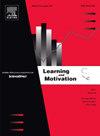Disclosing Chinese college students’ flow experience in GenAI-assisted informal digital learning of english: A self-determination theory perspective
IF 1.8
4区 心理学
Q3 PSYCHOLOGY, BIOLOGICAL
引用次数: 0
Abstract
The role of flow experience in enhancing GenAI-assisted informal digital learning of English (GAI-IDLE) has recently gained increasing attention. However, the mechanisms underlying the achievement of flow experience in this context remain underexplored. Grounded in Self-Determination Theory (SDT), this study investigates how GAI-IDLE influences flow experience through the lens of three basic psychological needs: autonomy, competence, and relatedness. Specifically, we aim to examine the mediating effects of these psychological needs on the relationship between GAI-IDLE and flow experience. To achieve this, we conducted a survey among 333 English as a Foreign Language (EFL) learners from various colleges in China. Using Partial Least Squares Structural Equation Modeling (PLS-SEM) with Smart PLS 4.0 software, our results show that GenAI literacy and English proficiency positively and directly impacted flow experience, while gender had no direct effect. GAI-IDLE directly predicted flow experience and positively influenced autonomy and relatedness, which in turn directly enhanced flow experience. Thus, GAI-IDLE indirectly affected flow experience through the mediation of autonomy and relatedness. However, contrary to SDT, GAI-IDLE did not directly affect competence, and competence did not directly influence flow experience, resulting in an insignificant mediating role for competence. We discuss potential explanations for these findings and conclude with educational implications.
自我决定理论视角下中国大学生在genai辅助下非正式数字英语学习中的流动体验
心流体验在促进基因人工智能辅助英语非正式数字学习中的作用最近得到了越来越多的关注。然而,在这种情况下实现流动体验的机制仍未得到充分探索。本研究以自我决定理论(Self-Determination Theory, SDT)为基础,通过自主性、能力和关联性这三种基本心理需求,探讨了ai - idle对心流体验的影响。具体来说,我们的目的是研究这些心理需求在ai - idle和心流体验之间的中介作用。为了实现这一目标,我们对来自中国不同学院的333名英语作为外语(EFL)学习者进行了调查。利用Smart PLS 4.0软件进行偏最小二乘结构方程建模(PLS- sem),我们的研究结果表明,基因素养和英语水平对流动体验有积极和直接的影响,而性别没有直接影响。ai - idle直接预测流体验,正向影响自主性和关联性,进而直接增强流体验。因此,ai - idle通过自主性和关联性的中介间接影响心流体验。但与SDT相反,GAI-IDLE不直接影响胜任力,胜任力不直接影响流体验,对胜任力的中介作用不显著。我们讨论了这些发现的可能解释,并总结了教育意义。
本文章由计算机程序翻译,如有差异,请以英文原文为准。
求助全文
约1分钟内获得全文
求助全文
来源期刊

Learning and Motivation
Multiple-
CiteScore
2.90
自引率
0.00%
发文量
53
期刊介绍:
Learning and Motivation features original experimental research devoted to the analysis of basic phenomena and mechanisms of learning, memory, and motivation. These studies, involving either animal or human subjects, examine behavioral, biological, and evolutionary influences on the learning and motivation processes, and often report on an integrated series of experiments that advance knowledge in this field. Theoretical papers and shorter reports are also considered.
 求助内容:
求助内容: 应助结果提醒方式:
应助结果提醒方式:


